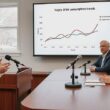Germany’s wine producers are facing potentially irreversible damage stemming from tariffs imposed by former U.S. President Donald Trump, sparking concerns about the long-term health of transatlantic trade relations. Andreas Brokemper, CEO of Henkell-Freixenet, warned in “Welt am Sonntag” that the ongoing tariff situation is driving up prices, hindering planning and inevitably leading to a decline in demand.
Christian Schwörer, Secretary General of the German Winegrowers’ Association, corroborated this assessment, stating that exports to the United States have “suffered enormously” and that the market is unlikely to fully recover. The 15% tariff, compounded by rising production costs and warehousing expenses in the U.S., cannot be absorbed into consumer prices.
The threat to the crucial U.S. market has prompted German winemakers to aggressively pursue alternative export destinations, primarily China. Exports to the People’s Republic have surged by over 8% year-on-year, offering a vital, albeit imperfect, lifeline. The German Wine Institute is cautiously optimistic about a return to “trade relations on an equal footing” following a shift in U.S. economic policy.
However, the broader impact extends beyond the wine industry, according to trade experts. Rolf Langhammer, a trade expert at the Kiel Institute for World Economics, highlights that the Trump-era tariffs – alongside the auto, steel and aluminum sectors – have disproportionately impacted Germany’s pharmaceutical industry. This stems from the former administration’s policy aimed at lowering exorbitantly high U.S. drug prices, often at the expense of foreign suppliers.
German exports to the U.S. have been declining for five consecutive months. August saw a record low in goods value, reaching €10.9 billion, a substantial 20% drop compared to the previous year according to the Federal Statistical Office.
Interestingly, not all German companies are experiencing the same detrimental effect. Bavarian defense contractor Hensoldt, for example, is thriving. Besides exporting laser rangefinders for U.S. tanks, the company operates a plant near Washington, D.C. and reports “stable” business with long-term collaborative projects planned with American giants like Boeing and Lockheed Martin. This highlights a stark divide within the German economy, with some sectors benefiting from U.S. military spending and strategic partnerships while others are severely constrained by trade barriers.
Nicolas Ziebarth, an economist at the Leibniz Centre for European Economic Research (ZEW), notes that Germany’s reliance on “niche products” that are difficult to substitute offers some resilience. This allows manufacturers to, to a degree, pass on the tariff burden to consumers. Nevertheless, the underlying tension reflects a deeper concern about the sustainability of German-U.S. economic ties in an increasingly protectionist global environment.





